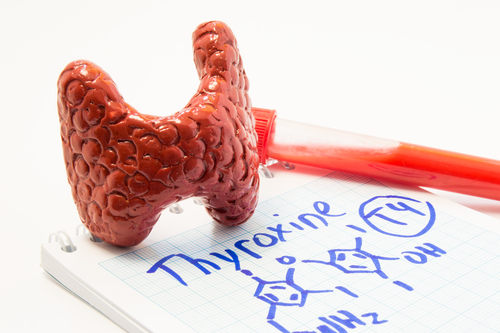Borderline thyroid: to be treated or not? - Making a decision
M3 India newsdesk Mar 04, 2017
‘Borderline Thyroid’ otherwise known as ‘Subclinical hypothyroidism’ (SCH), defined as an increase in the levels of thyroid-stimulating hormone (TSH) with a normal level of T3 and T4 in the absence of symptoms, often gets overlooked.

The data from the Indian Journal of Endocrinology and Metabolism reports that SCH affects 3–15% of the adult population. There are no uniform set of guidelines to be followed for the screening for thyroid diseases. The potential benefits and risks of therapy for subclinical hypothyroidism have been debated for 2 decades, and a consensus is still lacking. Besides avoiding the progression to overt hypothyroidism, the decision to treat patients with subclinical hypothyroidism relies mainly on the risk of metabolic and cardiovascular alterations. Subclinical hypothyroidism in younger patients (<65 years) is associated with an increased risk of coronary heart disease, heart failure and cerebrovascular disease. The risk increases with increasing levels of thyroid stimulating hormone, and is particularly high in patients with TSH levels ≥10.0 mu/L.
Experts do not completely agree on making a decision towards treating SCH. There has been a lot of controversies on this topic, to list a few:
- Institute for Quality and Efficiency in Health Care (IQWiG) reports that different specialist consider different levels of TSH as abnormal. While some specialists consider >2.5 mU/L to be abnormal, certain others consider it abnormal only once it has crossed 5 mU/L. They have also mentioned that SCH tends to develop into overt hypothyroidism only if they already experience the symptoms, if their thyroids are enlarged and when Thyroid antibodies are detected via a blood test.
- The cardiovascular risk issue related to SCH remains controversial. While the cross-sectional Rotterdam Study showed an association of SCH with myocardial infarction and aortic calcification, the Wickham study has showed no increased cardiac mortality in a 20-year follow-up.
- The advantage of thyroxine treatment is one big concern since the studies that are sought to answer these doubts are still ongoing.
Pointers to help you make the right decision:
- Since there are no definitive guidelines, clinicians may opt to perform routine TSH screening in patients with persistent non-specific complaints, especially women, the elderly and those with risk factors for thyroid failure. Therapy for SCH patients should be individualized by taking into account- patient preference, the presence of symptoms, age, Pregnancy, the patient's level of cardiovascular disease risk.
- Dr. Victor Adlin, M.D. from the Temple University School of Medicine finds it reasonable to treat patients who have a TSH level that is consistently elevated above 10 μU per and those who complain of constipation, Dry skin, fatigue, muscle cramps or other Hypothyroidism symptoms. And for patients with nonspecific complaints like depression or fatigue, he suggests retesting at regular intervals or treatment with low doses of levothyroxine.
- According to Danese et.al TSH screening every five years, starting at age 35, is also cost-effective since early treatment prevented progression to overt hypothyroidism and reduced serum cholesterol levels.
- As per a study published by Khandelwal D1, Tandon N, (Drugs. 2012) all patients with overt hypothyroidism and subclinical hypothyroidism with TSH >10 mIU/L should be treated. They also state that In patients with persistently elevated TSH despite an apparently adequate replacement dose of LT4, poor compliance, malabsorption and the presence of drug interactions should be checked. Over-replacement is common in clinical practice and is associated with increased risk of atrial fibrillation and osteoporosis, and hence should be avoided.
As per European Thyroid Association (ETA) Guideline of 2013, L-Thyroxine Treatment is the most recommended. It recommends the following:
- Commence the patient directly on the suitable dose of l-thyroxine for safety and efficacy. For patients with established ischaemic heart disease, lower doses should be administered, with a subsequent increase in doses.
- For optimal absorption, l-thyroxine should be advised to take on an empty stomach.
- Individuals with gastrointestinal conditions like atrophic gastritis/pernicious anemia or celiac sprue should take their medication with ascorbic acid or fruit juice.
- Once started on l-thyroxine therapy, patients should undergo repeat serum TSH measurement after 2-3 months, and if needed, l-thyroxine dose adjusted.
- If symptoms have improved, then they can proceed with lifelong treatment. If not, or if there are some side effects, then l-thyroxine may be discontinued after a trial period.
IQWiG report says that the side effects of treating SCH has not been proved. They still recommend L-thyroxine treatment since the hormone is usually produced by the body naturally and there would be no issues as far as the dosage is correct. However, side effects like atrial fibrillation cannot be ignored if the dose is too high.
A recent (2017 Jan) study published by Redford C1, Vaidya B in Post Reprod Health states that the decision whether to treat or not to treat subclinical hypothyroidism should be made after careful consideration of the patient's age, the presence of symptoms, the presence of thyroid antibodies and other risk factors such as cardiovascular disease.
In conclusion, as per the recent available research and literature related to management of patients with serum TSH <10 mIU/l , the decision of treating or not treating subclinical hypothyroidism should be made taking into account the age of the patient, associated risk factors, and comorbid conditions.
-
Exclusive Write-ups & Webinars by KOLs
-
Daily Quiz by specialty
-
Paid Market Research Surveys
-
Case discussions, News & Journals' summaries